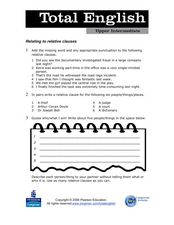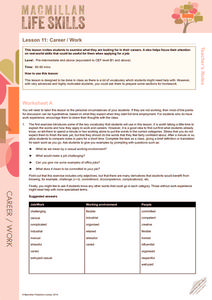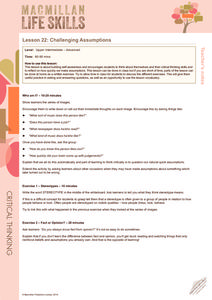Curated OER
Total English Upper Intermediate: Question Time!
In this relationship key vocabulary worksheet, students unscramble 8 groups of words to form questions, write a description of an unusual place, and write 6 questions about the place they chose.
Curated OER
Question Time!
In this question writing worksheet, 2nd graders put words in the correct order to make questions. They also write their own questions to ask two other students.
Curated OER
Total English Upper Intermediate: Relating to Relative Clauses
For this relative clauses practice worksheet, students add the missing words and punctuation to 6 sentences, write 6 relative clauses, and write about 5 people or things in the provided space.
Curated OER
Go Forward and Back With Time
In this time worksheet, students solve a set of 6 problems, telling what time it is from one time given to other intervals given.
Curated OER
Who is Mr. Green?
In this who is Mr. Green learning exercise, students read a paragraph and chart about Mr. Green to rewrite sentences using the negative form of to be. Students answer seven questions.
Texas Instruments
Is It or Isn't It Proportional
How can you tell if number relationships are proportional? Mathematicians investigate proportional relationships. They compare and contrast functions and graphs to determine the characteristics of proportional relationships, as well as...
Smithsonian Institution
Mary Henry: Journal/Diary Writing
A great way to connect social studies with language arts, a resource on Mary Henry's historical diary reinforces the concepts of primary and secondary sources. It comes with an easy-to-understand lesson plan, as well as the reference...
Savvas Learning
Verbs: Future
As part of their study of future tense verbs, language learners engage in activities, read fables, and sing songs. The 25-page packet includes detailed lessons, worksheets, graphic organizers, and answer keys for assessments.
Macmillan Education
Career/Work
Learners explore their perspectives of different occupations, discover what life skills will be valuable to them in whatever career path they choose, and discuss important terms related to the work environment.
Macmillan Education
Critical Thinking
Encourage learners to think deeply about the information they read or hear. Through a series of life skills worksheets, your pupils will consider the need for objectivity, identifying missing information, and problem solving.
Curated OER
Speciation and Genetic Drift Worksheet
Fifteen terms pertaining to speciation, extinction, and gene flow are to be matched to their definitions. This simple, easy-to-read learning exercise can be used as a pop quiz for your biology learners when studying natural selection...
Lesson Plans
Macromolecule Worksheet
Biology scholars are asked to define and explain, to complete a chart, and to fill in the blanks for seventeen macromolecule questions. Easy for pupils to read and comprehensive in content, this is a resource that you will want to use....
Curated OER
Introductory Bacteria and Virus Worksheet
Compare and contrast eukaryotes, prokaryotes, and viruses with a chart and a Venn diagram. Beginning microbiologists consider motility, reproductive ability, DNA content, and the presence of organelles. They write short answers to...
iCivics
Drafting Board: Interest Groups
Does the influence of interest groups harm a political system? Your class members will analyze the role of interest groups in American politics, as well as consider the effect of perspective, bias, loyalty, and the First Amendment.
K12 Reader
Waves & Currents
Challenge your young readers with a passage about physical science. After reading about sound waves and electric currents, kids answer five reading comprehension questions about what they have read.
Curated OER
Pizza Sticks
Kids won't just follow a recipe to increase their cooking ability, they'll use it to locate information in a text. They read the simple recipe, then use information from the recipe to fill in the blanks in a story that shows one person...
University of Florida
Clothing Capers: Creativity
No matter the age of your sewing pupils, they will enjoy these activities and projects that develop basic sewing machine use, following patterns, and finally creating a fun project of their own.
The New York Times
Great Debate: Developing Argumentation Skills
"Advertising has no impact on whether people buy something." "Looting is morally permissible during national disasters and emergencies." "Gay teenagers should be allowed to take dates to the prom." Considering a class debate? Check out...
Read Works
Trading Pumpkins
Can you imagine a pumpkin patch without pumpkins? Learners read how Tammy's family solves their problem in a cooperative way, followed by a set of 10 reading comprehension questions.
Poetry Internation Volume 17, 2011
Alliteration, Consonance, and Assonance in Poetry
Three poems, “Under the Mangoes” by Jacqueline Bishop, Eleanor Wilner’s “What It Hinges On,” and Robert Frost’s “Stopping by Woods on a Snowy Evening,” provide the text for an examination of alliteration, consonance, and assonance. After...
Curated OER
Problem-Solving Strategy: Act It Out
In this mathematics worksheet, 1st graders identify what time the concert starts and ends. Then they use a clock to act out the time and draw the hands on the clock to show when the concert will be over.
Curated OER
Cool Colons
In this colons and time worksheet, 2nd graders review how colons are used to write the time. Students then circle the time that illustrates the correct placement of the colon and write it on the line. Students then fill in their own time...
Macmillan Education
What Do You See?
Encourage learners to develop greater self-awareness and an understanding of perception versus reality. Here you'll find a life skills instructional activity that includes worksheets, discussion, and brainstorming activities on the topic...
Macmillan Education
Challenging Assumptions
After experiencing how quick and easy it is to make judgments as part of an opening activity, learners discuss the concept of a stereotype and the need to think critically and question our immediate assumptions.

























